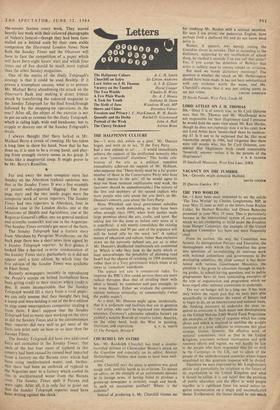%w in Letters The Halfpenny Culture A. C. H. Smith Churchill
on Satire Sir Linton Andrews Lord Attlee on .1. H. Thomas A. S. B. Glover Vacancy on the Tumbril David Cooper The Two Worlds Charles H. Weitz A Few Plain Words Dr. A. J. Hawes A Task for Youth Anthony D. Steen The Sixth of June Woodrow Wyatt, MP Shows and Chaos Dorothea Turner Freedom and Privacy 1. F. MacKinnon. W. H. Rawle Quoodle and the Derby Rachel 0. Greenwood Portrait of the Week John A. Hall The Cherry Orchard Adrian Brine
THE HALFPENNY CULTURE
SIR,—'1 write this article as a poet,' Mr. Duncan began, and went on to say, 'If the Tory Party . . had a new attitude to art . . . it would immediately achieve the support of the intellectual minority who are now "committed" elsewhere.' This bardie cele- bration of the arts as a political expedient immediately achieved the support of Mr. Hallinan, who-supposes that 'There surely must be a far greater number of those in the Conservative Party who have a deep interest in the arts,' (If he would agree to map out those resonant implications next week, the Spectator should be unputdownable.) The naivety of the first and snobbery of the second explain why most people who care about the arts don't, to Mr. Duncan's concern, care about the Tory Party.
More Whitehall and local government subsidies are certainly worth demanding, as they have been often enough since 1959, when both parties made large promises about the arts, crafts, and sport. But asking just for the same as before only more of it k superficial: it will merely consolidate the existing cultural pattern, and 95 per cent of the populace will still be bored silly by the word 'art.' A radical notion of education and culture, rather than exclusive stress on the narrowly defined arts per se. is what Mr. Duncan's disaffected intellectuals are committed to. Which is why they look to the party which at least acknowledges the possibility of planning (and hasn't had the chance of revoking its 1959 promises), rather than to a Tory government which trusts at all times to 'immediate' expedients.
The topical test case is commercial radio. To improve the BBC's thin sound services there are more radical therapies than that of rivalling them with what is bound, by commerce and past example, to be even thinner. Either we evaluate the communi- cations business culturally; or commercially ('what the public wants').
As a poet, Mr. Duncan might agree, incidentally, that it is audiences and facilities that are in question —not artists, who can't be legislated into immediate existence. Germany's admirable subsidies haven't yet yielded a notable flourish of creative talent; America, on the other hand, leads the West in painting,


































 Previous page
Previous page